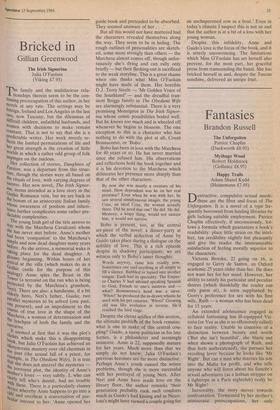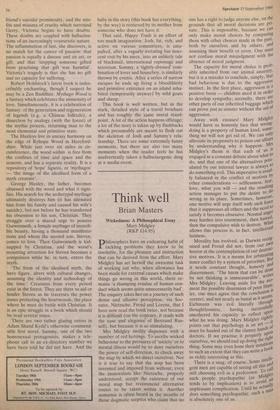Fantasies
Brandon Russell
The Unforgotten Patrice Chaplin (Duckworth £8.95) Mythago Wood Robert Holdstock (Gollancz £8.95) Happy Trails Adam Shand Kydd (Heinemann £7.95)
Destructive, compulsive sexual needs: these are the fibre and focus of The Unforgotten. It is a novel of a type fre- quently borrowed from lending libraries by girls lacking suitable employment. Patrice Chaplin effectively, if unconsciously, fol- lows a formula which guarantees a book's readability: place little strain on the intel- lect, tax credibility slightly but pleasantly and give the reader the immeasurable satisfaction of feeling morally superior to the characters.
Victoria Brooke, 22 going on 16, is engaged to Gerry de Santos, an Oxford academic 25 years Older than her. He does not want her for her mind. However, her ability to satisfy his particular and peculiar desires (which thankfully the reader can only guess at), is soon supplanted by Gerry's preference for sex with his first wife, Ruth — a woman who has been dead for 15 years.
An extended adolescence engaged in celluloid fantasising has ill-equipped Vic- toria (or Vee as she is so offensively called) to face reality. Unable to conceive of a distinction between beauty and worth (Tut she isn't beautiful', she blurts out when shown a photograph of Ruth, and thus feels unthreatened), she pursues her recoiling lover because he looks like `Mr Right'. But can a man who marries his son into the Mafia for profit, and who tells anyone who will listen about his fiancee's sexual adventures (as a lesbian stripper on a tightrope in a Paris nightclub) really be Mr Right?
Inexorably, the story moves towards confrontation. Tormented by her mother's aristocratic preoccupations, her only friend's suicidal promiscuity, and the mis- fits and miasma of cruelty which surround Gerry, Victoria begins to have doubts. These doubts are coupled with hallucina- tions of an increasingly voyeuristic nature. The inflammation of lust, she discovers, is no match for the cancer of passion: that passion is equally a disease and an art, or gift, and that 'stopping someone gifted from practising that gift was harmful'. Victoria's tragedy is that she has no gift and no capacity for suffering.
Robert Holdstock's latest book is indes- cribably enchanting, though I suspect he may be a Zen Buddhist. Mythago Wood is a fantasy which celebrates the immensity of love. Simultaneously, it is a celebration of fantasy: of the generation and regeneration of legends (e.g. a Chinese folktale), a dissection by analogy (with the forest) of the mythic process, returning man to the most elemental and primitive state.
The Huxleys live in uneasy harmony on the edge of Ryhope Wood in Hereford- shire. While just over six miles in cir- cumference, the wood within is free from the confines of time and space and the seasons, and has a separate reality. It is a repository of 'hope' figures, or 'mythagos' — 'the image of the idealised form of a myth creature'.
George Huxley, the father, becomes obsessed with the wood and what it signi- fies. His search for the archetypal mythago ultimately destroys him (it has alienated him from his family and caused his wife's suicide), but not before he has transferred his obsession to his son, Christian. They struggle over a shared urge to possess Guiwenneth, a female mythago of incredi- ble beauty, having a thousand manifesta- tions and whom the second son, Steven, comes to love. Then Guiwenneth is kid- napped by Christian, and the wood's mounting attraction for Steven becomes a compulsion while he, in turn, enters the myth.
'The form of the idealised myth, the hero figure, alters with cultural changes, assuming the identity and technology of the time.' Creatures from every period exist in the forest. They are there to aid or hinder Steven as he traverses the power zones protecting the heartwoods, the place where he must do battle with Christian. It is an epic struggle in a book which should be read several times.
There are two rather glaring errors in Adam Shand Kydd's otherwise commend- able first novel. Sammy, one of the two homosexual protagonists, makes a tele- phone call to an ex-directory number we have been told he did not have. And the baby in the story (this book has everything, by the way) is retrieved by its mother from someone who does not have it.
That said, Happy Trails is an effort of too much imagination. Josh, fat, rich, and active on various committees, is cata- pulted, after a vaguely irritating but inno- cent visit by his niece, into an unlikely tale of blackmail, international espionage and terrorism. Sammy, a 'tightly-dressed' com- bination of lover and houseboy, is similarly thrown by events. After a series of narrow escapes he ends up living a bloodthirsty and primitive existence on an island inha- bited (temporarily anyway) by wild goats and sheep.
This book is well written, but in the stark, detailed style of a travel brochure and has roughly the same moral stand- point. A lot of the action happens offstage; a lot of the story is taken up by flashbacks which presumably are meant to flesh out the skeleton of Josh and Sammy's rela- tionship. There are some extremely funny moments, but there are also too many moments when the reader feels he has inadvertently taken a hallucinogenic drug at a media event.



















































 Previous page
Previous page